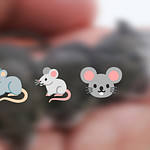
Essay about Good you do, good you find - the philosophy of good deeds
From childhood, we are taught to do good deeds, to help the people around us and to be trustworthy people. This teaching is passed down from generation to generation, and many of us have formed a lifestyle of doing good both for ourselves and for those around us.
According to the popular saying "Good you do, good you find", if we do good deeds, we will have good things in life. Indeed, when we help people, when we give them support and encourage them to keep fighting, we do not only good for them, but also for ourselves. Many times, those good deeds are rewarded by return, by the gratitude and affection of the people who are grateful for the help given to us.
Good deeds do not necessarily have to be big or expensive acts, but also the small and insignificant ones, such as a smile, a kind word or a hand extended in difficult times. They can change destinies, bring hope and bring light into the lives of people going through difficult times. Also, good deeds can bring a positive change in society as well, by getting involved in charitable activities or by supporting noble causes.
Charity and altruism are virtues that should not only be practiced in times of celebration or crisis, but also every day, every moment. Being a good man, a man who does good, is a personal choice and a way to live a rewarding and fulfilling life. We should not wait for gratitude or reward, but be honest and open in our intentions, knowing that what we give will come back to us in one way or another.
In a world where selfishness and self-interest seem to be paramount, the idea of doing good without getting something in return can seem slightly outdated or even naive. However, the idea of "good you do, good you get" is more important than ever and should be a value we cultivate and promote in society.
Whether it's helping a friend in need, donating to a charity, or doing a kind gesture to a stranger, doing good without expecting anything in return is a noble act and wise. Not only can it make a significant difference in the lives of those around us, but it can also bring a lot of personal satisfaction and fulfillment.
Charity does not have to be something spectacular or particularly large. Small, everyday gestures like giving a smile or paying a compliment can make a significant difference in the lives of those around us. These actions not only make others feel good, but can also help build a more positive and cooperative social environment.
It is also important to be aware of the impact we have on the world around us and to act responsibly. Whether it's reducing energy consumption, recycling or buying eco-friendly products, each of us can make small changes in our daily lives that can help protect the environment and natural resources.
Finally, the concept of "good you do, good you get" is related to the idea of being a good and ethical person. By choosing to do good, we not only improve our lives and those around us, but also help build a better and fairer society.
In conclusion, "Good you do, good you find" is a simple yet profound expression that reminds us of the importance of good deeds and altruism in our lives. Through engagement, empathy and respect, we can be an example to those around us and bring about the positive change the world so desperately needs.
Presentation with the title "You do well, you find well"
The benefits of good deeds
Introduction:
The act of doing good to those around you is a beneficial behavior not only for those who receive, but also for the one who makes these gestures. Over time, various studies have demonstrated the physical, mental and social benefits of good deeds, from reducing stress and depression to improving the immune system. In this paper, we will explore the importance of good deeds and their benefits to those who do them and to the community as a whole.
The role of good deeds in reducing stress and anxiety:
Good deeds can reduce stress and anxiety levels by increasing levels of serotonin and dopamine, two neurotransmitters that affect a person's mood and well-being. Studies have shown that people who do good deeds have higher levels of serotonin and dopamine, which makes them happier and more relaxed. Also, helping others can reduce stress and anxiety by improving self-esteem and sense of worth.
Impact of good deeds on health:
Studies show that good deeds can have a positive impact on physical health by reducing blood pressure, heart disease risk and inflammation. Also, a study showed that people who volunteer are less likely to develop dementia than those who don't. The health benefits are likely related to the fact that good deeds reduce stress and improve self-esteem, which can lead to an overall healthier lifestyle.
The impact of good deeds on interpersonal relationships:
Good deeds can help build better and stronger interpersonal relationships. Helping those around you can create a bond of trust and respect between people, and this can lead to more open communication and improved relationships. Additionally, when people do good deeds together, such as volunteering at an organization, they can develop a community and a strong bond.
Charity as an act of altruism
Charity does not always have to be an action based on self-interest. Many times, people do their acts of kindness with the intention of helping others and making the world a better place. These acts of altruism are most valuable and can lead to significant positive change in our communities.
Benefit and impact on mental health
Acts of kindness not only have an impact on those who receive them, but also on those who do them. Studies show that acts of kindness can increase happiness and life satisfaction and reduce stress and anxiety. This can have a significant positive impact on mental health.
Charity and relationship building
Another positive consequence of acts of kindness is that they can help build and strengthen relationships with those around us. Through our actions of helping and supporting, we can build stronger bonds with our family, friends and community. These relationships can be invaluable in difficult times and bring joy and fulfillment to our lives.
The impact of charitable acts on society
Finally, acts of charity can have a significant impact on society as a whole. By our example, we can inspire and encourage other people to do acts of kindness and devote their time and resources to helping others. In this way, we can help create a better and more generous world where all people are treated with respect and compassion.
Conclusion
In conclusion, "good you do, good you find" is a life principle we should all follow. Our actions today can have a positive or negative impact on our lives and those around us, and doing good is a choice we can make in every moment of our lives. There is no need to wait for a crisis or a challenge to get involved and do good. Every small or big gesture can make a difference and bring smiles and joy to the lives of those around us. Finally, doing good is also a way to improve our quality of life, to feel fulfilled and to contribute to a better and more harmonious environment for all of us.
Descriptive composition about The good we do comes back to us
Kindness is one of the most important human values and represents a way of life that can bring many benefits to us and to those around us. The good we do comes back to us in one way or another, and this idea must be one we apply daily.
The first step to doing good is to be aware of our power to help others. It may seem hard to find the time or resources to help, but in reality there are many small things we can do that can make a big difference. Whether it's helping an elderly neighbor with their shopping bags or smiling and saying hello to someone who looks sad, every gesture counts.
Another way to do good is by getting involved in our community. This can include volunteering at non-profit organizations or getting involved in fundraising campaigns for causes we care about. Community involvement can not only give us the opportunity to do good, but also to connect with people with common interests and feel more connected to the world around us.
It is important to remember that the good deeds we do do not have to be with the intention of receiving something in return. If we do good just to get recognition or to get something in return, then we cannot expect positive effects. Instead, we should do good out of a sincere desire to help and improve the lives of those around us.
Finally, we must remember that the good we do comes back to us in one way or another. Whether it's the sense of fulfillment we get when we help someone, or the positive relationships we build with those around us, every good deed has a positive influence on us and those around us. Therefore, we must encourage this idea and encourage people to do good in their daily lives.






